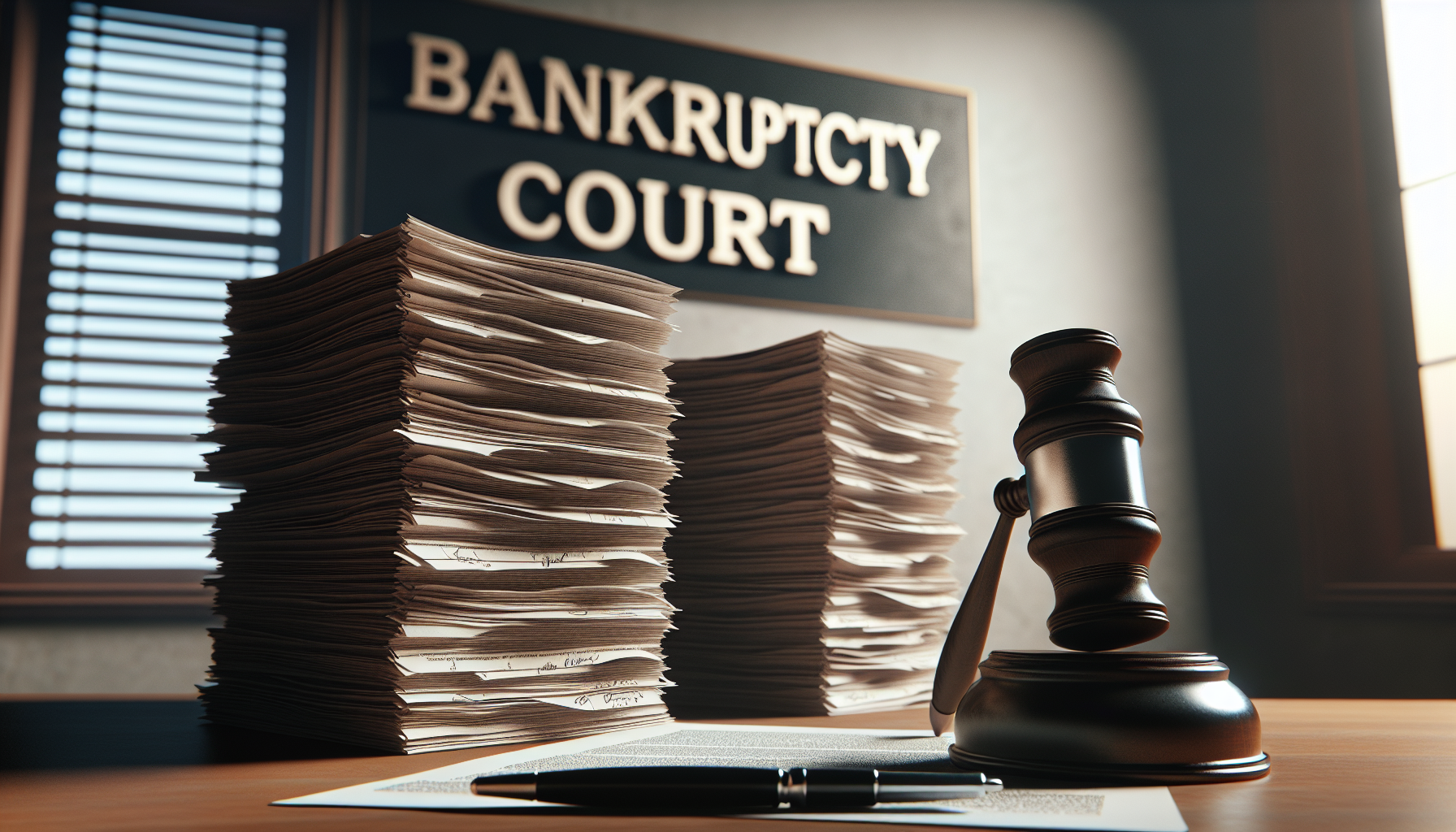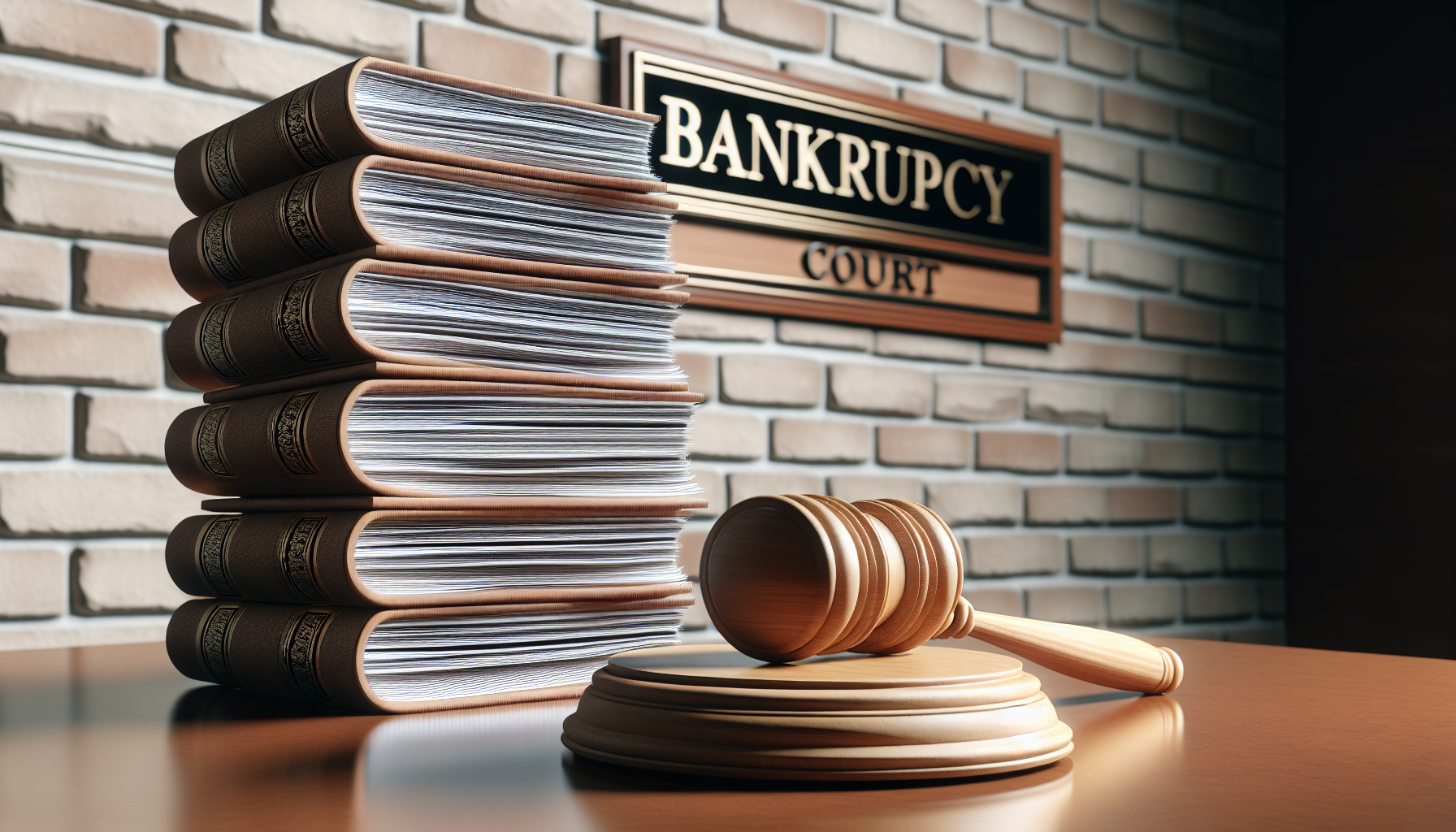
Navigating financial difficulties that may result in insolvency calls for a thorough comprehension of the bankruptcy process, as well as the expected insolvency legal charges. The initial step is to identify the associated costs which are unavoidable, as bankruptcy filing costs can be substantial.
Specific types of bankruptcy carry varying fees.
For example, filing for Chapter 7 bankruptcy might result in higher court fees or liquidation judicial dues, while opting for Chapter 13 bankruptcy may be less costly but requires a longer commitment period.
Another significant aspect includes attorney fees, which play a crucial role in debtor court expenses during bankruptcy proceedings. These costs can fluctuate depending on certain factors such as case complexity, the attorney’s level of expertise, and your geographical location. It’s highly recommended to set aside sufficient funds for insolvency legal charges, bankruptcy filing costs, debtor court expenses, and liquidation judicial dues.
Understanding Bankruptcy Filing Costs
Filing for bankruptcy can be intimidating, especially since it’s often associated with financial ruin, missed payments, and various expenses. It’s critical to understand the intricacies of these costs involved.
Many people are under the misconception that personal insolvency fees are the only costs to ponder.
Yet, in reality, another significant expenditure is tribunal tariffs, incurred while seeking professional legal advice.
This assistance could come with a substantial cost, but its value in guiding you through the bankruptcy process should not be underestimated.
Investing in professional help can prevent costly errors.
Depending on the complexity of your situation, attorney fees may be high or moderate. Determining their worth in your specific circumstance becomes crucial as avoiding such advice could lead to higher overall expenses. even to financial ruin payments.
Notably, individual bankruptcy and corporate bankruptcy costs differ, especially when it comes to court-imposed charges. Personal insolvency fees, corporate bankruptcy costs, tribunal tariffs, and financial ruin payments can lead to significant financial challenges.

What are the Debtor’s Court Expenses?
Deciphering debtor court expenses is crucial when exploring the bankruptcy process. The initial costs encompass court fees, particularly the ‘Official receiver charges’, the primary fees associated with court case management.
This expense could be the determining factor when an individual considers filing for bankruptcy.
Effective management of these ‘Official receiver charges’, which generally fall within a specific range, can assist in reducing the ‘Bankruptcy administration fees’.
These administrative costs often play a significant role during the entire bankruptcy procedure.
‘Bankruptcy administration fees’ also encapsulate the expenses related to legal assistance.
This support, vital in bankruptcy cases, comes at a price. Various elements, such as the complexity of the case and the legal jurisdiction’s practices, impact these fees.
An accurately devised budget can alleviate the ‘Debt discharge costs’. These costs, associated with the liquidation of obligations, can be efficiently managed with proper consideration to Official receiver charges, Bankruptcy administration fees, Debt discharge costs, and Chapter charges.
Key Points About Bankruptcy Expenses
- Item 1 ‘Official receiver charges’ are primary fees associated with court case management in bankruptcy proceedings.
- Item 2 Effective management of ‘Official receiver charges’ can help reduce ‘Bankruptcy administration fees’.
- Item 3 ‘Bankruptcy administration fees’ include expenses related to legal assistance, which is crucial in bankruptcy cases.
- Item 4 ‘Debt discharge costs’, associated with the liquidation of obligations, can be efficiently managed with a well-planned budget.
Breaking Down Liquidation: Judicial Dues
Understanding the financial intricacies of liquidation judicial dues, Chapter expenses associated with it, and their role in the debtor’s expenditure holds immense significance. To navigate effectively through bankruptcy proceedings, building a sound understanding of these charges, particularly court costs, is essential.
These fees constitute a substantial part of the debtor’s spending and fluctuate based on numerous factors.
Equally crucial is the comprehension of Insolvency case charges, particularly the cost associated with the submission of applications.
Both debtors and creditors should brace themselves for these expenses when filing insolvency applications. This understanding of the debtors’ expenditure structure, coupled with strategic planning, is key to managing these fees adeptly.
Diving deeper, we also explore the Trustees fees and the costs associated with hiring legal representation. These expenses form a vital part of the overall expenditure during an insolvency case. Legal professionals’ charges are an integral part of Chapter expenses, Debtors expenditure, Trustees fees, and Insolvency case charges.
Decoding Tribunal Tariffs in Bankruptcy
Navigating bankruptcy litigation expenses can be challenging, particularly when trying to understand the intricacies of tribunal tariffs. During a financial downfall, it is critical to comprehend the fees associated with various types of bankruptcy.
Tribunal tariffs, for instance, vary depending on whether you’re facing liquidation law costs or dealing with restructuring tariffs.
The journey towards decoding these tariffs begins with understanding the jargon used in bankruptcy cases.
It’s essential to familiarize yourself with terms like ‘financial downfall fees’, ‘indigence court costs’, and ‘liquidation law costs’. Legal advice is often beneficial in demystifying these tariffs, although it adds to the indigence court costs.
Regardless, becoming knowledgeable about these expenses could lead to significant savings in the long run.
Effective strategies for managing tribunal tariffs involve researching comparable bankruptcy cases to estimate potential bankruptcy litigation expenses. Consulting with financial advisors or lawyers can help navigate the complexities of liquidation law costs, indigence court costs, financial downfall fees, and bankruptcy litigation expenses.
Understanding Bankruptcy Litigation Expenses
- Understanding the terminology used in bankruptcy cases, such as ‘financial downfall fees’, ‘indigence court costs’, and ‘liquidation law costs’, is essential in navigating bankruptcy litigation expenses.
- Legal advice can help demystify the complexities of these tariffs, although it may add to the overall costs.
- Being knowledgeable about these expenses could lead to significant savings in the long run.
- Researching comparable bankruptcy cases and consulting with financial advisors or lawyers can provide an estimate of potential bankruptcy litigation expenses and help manage them effectively.
The Reality of Financial Ruin Payments
Facing financial distress is a formidable reality, laden with both emotional and monetary repercussions. One of the key elements often overlooked is the ‘Chapter filing fees’, which are integral to this process.
It’s not just a personal finance crisis; rather, it extends to these fees which are inseparably tied to the legal process of declaring insolvency or bankruptcy.
‘Financial collapse expenses’, often underestimated, encompass more than mere debts.
They include broader aspects such as the ‘Indebtedness court fees,’ a fundamental part of insolvency proceedings. Grasping the purpose and detailed breakdown of these charges paints a clearer picture of the financial ruin encountered during such predicaments.
The complexity of navigating bankruptcy-related legal proceedings frequently necessitates expert advice. This brings into the equation ‘Bankruptcy hearing costs’, usually inclusive of attorney fees. While these costs can greatly vary, the benefit and security of settling Chapter filing fees, financial collapse expenses, bankruptcy hearing costs, and indebtedness court fees should not be overlooked.
Navigating Through Personal Insolvency Fees
Recognizing the intricacies of personal insolvency helps, particularly when you’re finding it challenging to meet financial obligations. This intricate process, involving solvency proceedings costs, is a practical solution for individuals wrestling with overwhelming debts.
Ensuring you can make a well-informed decision requires comprehension of associated expenditures, which encompass not only solvency proceedings costs but also debt relief legal charges.
Initiating personal insolvency declarations involves upfront fees.
Legally affirming your financial incapacity to settle debts also implies incurring charges. These costs form a crucial part of financial distress costs, a significant component of the broader debt resolution process.
Professional legal assistance often becomes necessary when dealing with personal insolvency. Your attorney plays a pivotal role in maneuvering through these financial distress costs, associated with your insolvency process. The various factors influencing your legal representation cost can range from the intricacy of solvency proceedings costs, debt relief legal charges, financial distress costs, to debt resolution charges.
Key Points on Personal Insolvency Costs
- Understanding personal insolvency intricacies can aid in managing financial obligations, especially when facing difficulties in meeting them.
- Personal insolvency process involves various costs such as solvency proceedings costs, debt relief legal charges, and financial distress costs.
- Initiating personal insolvency declarations involves upfront fees and legally affirming financial incapacity to settle debts also incurs charges.
- Professional legal assistance is often necessary in navigating through the costs associated with personal insolvency, including the cost of legal representation which can be influenced by several factors.
Corporate Bankruptcy Costs: What to Expect
Navigating through the complex terrain of corporate bankruptcy can be intimidating. It is a process ripe with tribunal expenses and necessitates careful financial planning.
Taking this crucial step for companies drowning in a financial crisis can lead to a significant financial impact.
Among other things, the corporate bankruptcy process includes court-related costs that often account for a significant portion of the overall expenses.
Application fees contribute heavily to these expenditures, reflecting one facet of the associated financial crisis expenses. The costs incurred while applying for bankruptcy can vary greatly depending on specific circumstances.
It comes as no surprise that attorney fees constitute an additional layer to these expenses. Although obtaining legal assistance may seem like an added burden, it can often streamline the process, potentially resulting in long-term savings.
Knowledge of various types of corporate bankruptcy, from Chapter 7 to Chapter 11, and their associated costs is vital. Each type brings along its own set of unique financial implications, whether it be tribunal expenses, debt restructuring fees, liquidation proceeding costs, or financial crisis expenses.
Unraveling Official Receiver Charges in Bankruptcy Cases
Understanding the trajectory of bankruptcy includes unraveling the complex maze of financial ramifications it holds. A significant factor to focus on within this intricate network is the bankruptcy case filing charges.
These expenses, collected by the court for managing bankruptcy cases, are a critical element that shapes the overall cost of bankruptcy.
Declaring bankruptcy isn’t just a term; it is a process that comes with its own set of expenses.
Debt liquidation court costs feature prominently in this list. The process of selling off the debtor’s assets or liquidating them, with the aim of paying off creditors, is a cost-intensive step.
These charges can significantly escalate the overall expense of bankruptcy.
The path of bankruptcy is seldom easy to navigate without professional help.
This is where the role of a bankruptcy attorney becomes indispensable.
Their expertise attracts insolvency hearing fees. These fees are a part of the financial insolvency charges incurred during bankruptcy case filings, debt liquidation court costs, and insolvency hearings.
Bankruptcy Costs
- Bankruptcy case filing charges are significant expenses collected by the court for managing bankruptcy cases.
- Debt liquidation court costs, which include the process of selling off debtor’s assets to pay off creditors, can significantly increase the overall expense of bankruptcy.
- The expertise of a bankruptcy attorney is often necessary to navigate the complex process of bankruptcy, but their fees add to the financial insolvency charges.
- Insolvency hearing fees are part of the overall costs incurred during bankruptcy case filings, debt liquidation court costs, and insolvency hearings.

Get a Free Bankruptcy Case Evaluation